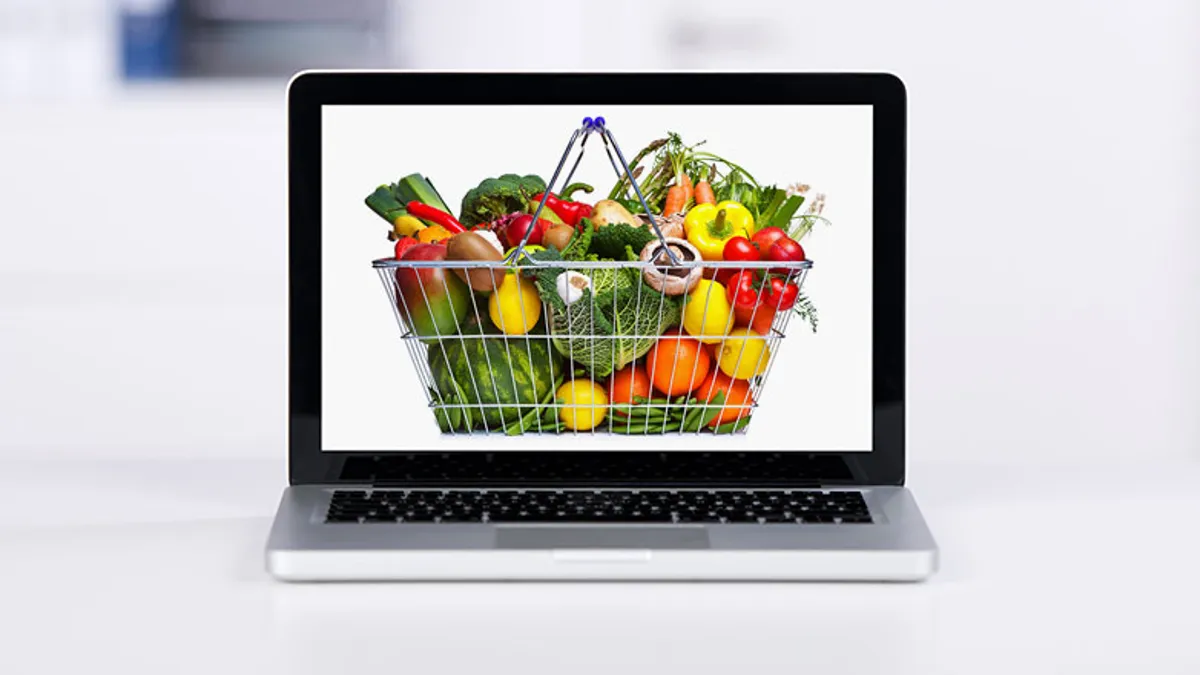Dive Brief:
- Movebutter, an online specialty grocer that promises low prices, a curated selection of staple products and direct-to-consumer sourcing is launching nationwide today, according to a company release.
- The service will focus on essential grocery items under its own brand with prices that it claims are 25% cheaper than those found at leading natural and organic grocers. Movebutter also says it will cut down on food waste by producing goods in small batches and never holding stock.
- Investors include venture capital firms as well as celebrities such as former NFL quarterback Joe Montana and Matthew Bellamy of the rock band Muse. Movebutter said it will use funds to acquire customers, expand its product range and build more distribution centers.
Dive Insight:
In an interview with Food Dive, Movebutter Founder and CEO Chai Mishra said he wants his online supermarket to be the preferred grocer for thousands of consumers. Unlike other specialty sites that offer pricey, non-essential items, Movebutter focuses on low prices and staple items.
Coming off a successful test that began in San Francisco and expanded to 47 states, the online grocer now wants to supplant brick-and-mortar retailers and other online grocers as the consumer's shopping destination.
“When customers buy from us, they’re getting all the essentials, and they’re saying, ‘This is my supermarket,’” Mishra said.
Can a start-up online grocer really compete against the likes of Amazon, Walmart and a growing list of other e-commerce grocery services? Mishra said he's confident in his model, which focuses on fast-selling items. It's an approach that grew from a key insight he and the team gained while studying grocers around the country. In most stores, they found, 80% of sales were coming from just 20% of the products. Movebutter decided to hone in on that 20%, and finalized its lineup around products that generated high interest and repeat sales. Then, the team sought out the best suppliers they could find to develop a limited selection for each category.
“We thought, okay, what is the best version of these products we can make?” said Mishra. “We didn’t want to have five different brands of mayo.”
Movebutter’s suppliers package the company’s products on site, then ship them to its sorting facility in San Francisco where each order then goes out for delivery. Consumers get their groceries anywhere between one and five days depending on location, Mishra said. Movebutter is currently building sorting facilities in the Midwest and on the East Coast. Mishra said the company plans to eventually offer same-day delivery.
Movebutter will not charge customers for delivery. The cost, said Mishra, is built into its business model, which leverages low overhead and a miniscule marketing budget in addition to its direct sourcing chain.
Movebutter will further differentiate itself by focusing on two areas gaining increased attention from consumers and the industry: ethical sourcing and reduction of food waste. Mishra said Movebutter works with suppliers that are socially and environmentally responsible. It also aims to bring in just enough product to stay ahead of demand, meaning less food will get thrown out by the company and, hopefully, by customers.
This is a tricky supply model, and one that flies in the face of the grocery industry’s traditional focus on overstocking. It could result in some out-of-stocks, but Mishra said Movebutter relies on sophisticated data and forecasting to determine accurate supply levels. It's a model that's similar to the direct-to-shelf systems that retailers such as Whole Foods are employing.
“I would rather understock than overstock products,” said Mishra.
Executing its concept will be critical in the crowded food retail space where the overwhelming majority of consumers still prefer to shop inside stores. Movebutter also has an uphill battle in convincing shoppers to use its service instead of their regular grocers, many of which have begun offering their own online shopping platforms.
In an e-commerce business that demands speed, Movebutter may also struggle to be competitive on delivery — at least at first.
If the company can execute and quickly speed up delivery, its unique model could really pay off. Nationwide distribution sets it apart from online-only grocers like FreshDirect and Peapod, while its low prices and limited assortment of high-quality products tap into the same demand streams that discounters like Lidl and Aldi are exposing. Ultimately, Mishra said he hopes to capitalize on consumer demand for a simpler, cheaper, better quality shopping experience, and to do it all in the rapidly growing online space. It's an ambitious plan reflected in Movebutter's slogan, "The Supermarket of the Future."








